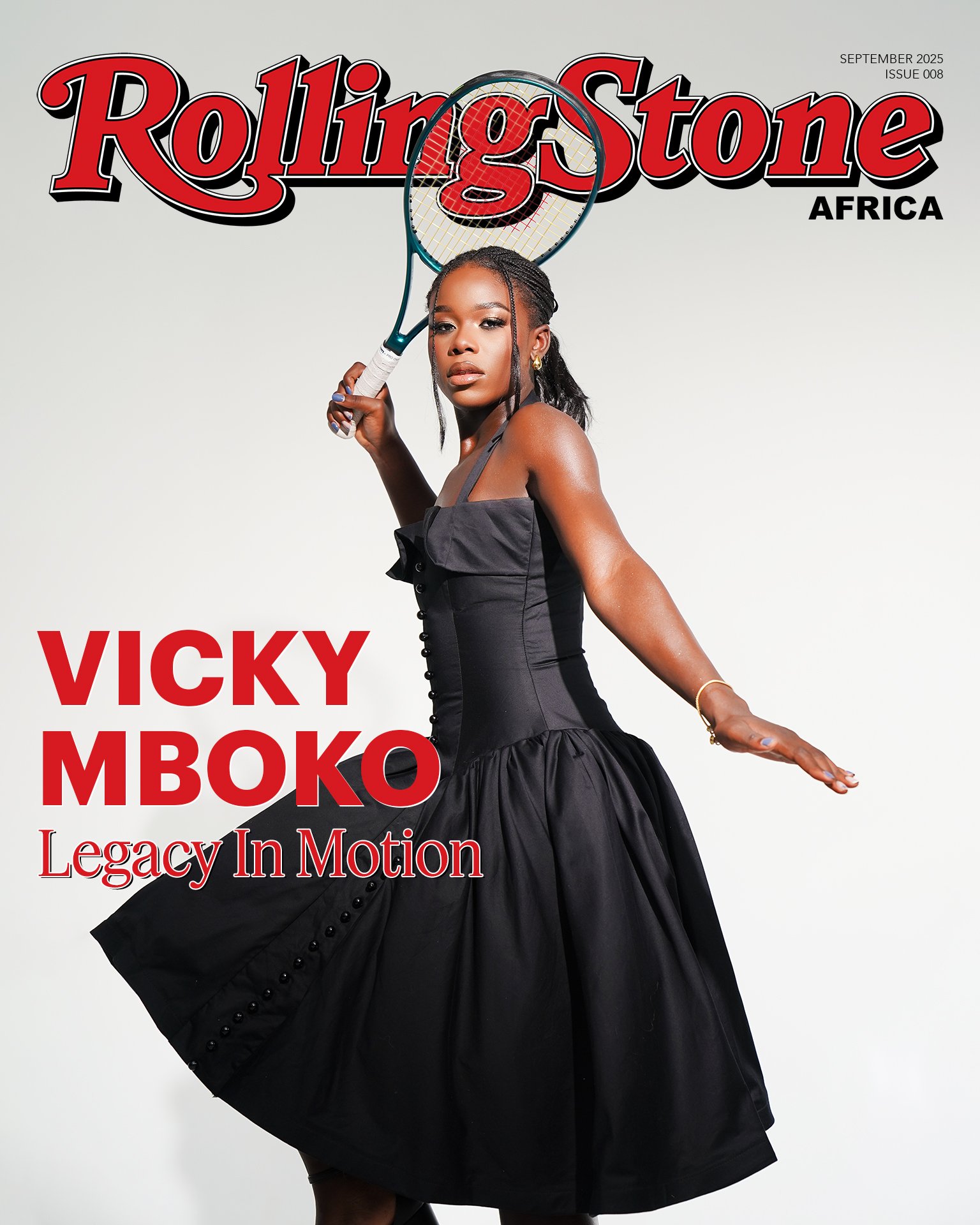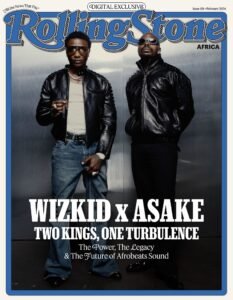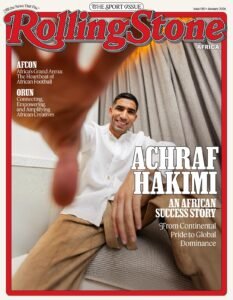History is not written in silence. It is etched in moments when the world stops to witness something extraordinary. In Montreal, at the National Bank Open WTA 1000 event, Vicky Mboko carved her name into history with a performance that stunned the world. She did not simply win matches, she dismantled expectations, culminating in a breathtaking victory over four-time Grand Slam champion Naomi Osaka in the finals. At just 18 years old, Mboko became the youngest Canadian to ever win the tournament, and in doing so, she signaled to the tennis world that a new era has begun.
This victory was more than a championship. It was a coronation. For years, Canada has celebrated names like Andreescu, Fernandez, and Bouchard, but now, Mboko has emerged not just as the future of Canadian tennis, but as its undeniable present. Her fearless play, raw athleticism, and unshakable composure marked a breakthrough that has electrified the sport. Montreal became the stage, but the echoes of her triumph are being heard across the globe.
Vicky Mboko’s story is not one of sudden fame but of relentless pursuit. Born into a family that left the Democratic Republic of Congo in search of opportunity, Mboko carries with her the resilience of survivors and the vision of dreamers. Tennis was not simply a game for her, it was destiny! From the time she first picked up a racquet at three years old, she carried a fire that even her older siblings, also athletes, could not ignore. That same fire burned brightest under the lights in Montreal.
Her run through the tournament was a masterclass in courage. Match after match, she toppled higher-ranked opponents with the ferocity of a veteran and the poise of a champion in waiting. By the time she reached the finals, the world had taken notice, and against Naomi Osaka, she delivered one of the most commanding performances of her career. For a young woman ranked outside the sport’s top 300 at the start of the year, the leap to becoming a WTA champion is nothing short of meteoric!
What sets Mboko apart is not only her physical skill but her mental edge. Tennis demands solitude, discipline, and an almost spiritual resilience. Time and again, Mboko has shown that she is not intimidated by the size of the stage or the weight of the moment. Instead, she thrives in it. That fighting spirit, inherited from her family’s journey and sharpened on the courts, has now made her a beacon of possibility for young athletes across Africa, Canada, and the world.
Her rise is also a triumph of representation. As a Black woman on the global stage, Mboko is rewriting what it means to be a Canadian tennis star. She embodies excellence not just for herself, but for every young girl who dares to believe she can take up space where few before her have stood. With each swing of her racquet, she is not only chasing trophies but breaking barriers, opening doors for the next generation.
“Legacy in Motion” is not just the title of this cover story, it is Vicky Mboko’s reality. At 18, her legacy is already unfolding in real time. The Montreal championship was the first of many, but its significance goes beyond the trophy. It represents the promise of a future where she continues to dominate courts, inspire millions, and carry forward the strength of her family’s sacrifices.
Vicky Mboko is not waiting to be great. She already is. And the world is finally catching up.
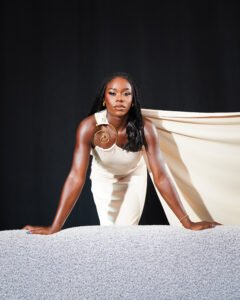
EXCLUSIVE INTERVIEW
RSA: At just 18, you’ve already etched your name in tennis history as the second-lowest ranked player to win a WTA 1000 title. When you look at that trophy, what does it symbolize for you beyond the numbers?
V.M: Winning that trophy gave me a huge boost of confidence in myself. I never imagined I would achieve a title like that so early, and it meant so much to me. For me, it symbolized all the hard work and everything happening behind the scenes that led to that exact moment. Words can’t fully describe how it felt, but it definitely motivates me to keep pushing forward and striving for more.
RSA: You beat four Grand Slam champions, Sofia Kenin, Coco Gauff, Elena Rybakina, and Naomi Osaka, in one tournament, a feat last matched by Serena Williams as a teenager. How did you process each win, and at what point did you realize something extraordinary was happening?
V.M: Throughout the tournament, I didn’t really see it as something extraordinary, it just felt like another competition. But looking back and reflecting on it now, I realize how incredible it really was, especially for me. I was so happy to have the chance to play against players who are former Grand Slam champions, and of course, Naomi was once world number one. That experience gave me a lot of hope and made me realize that I’m capable of achieving great things, that anything is possible. I’d say it really helped me grow and gave me even more motivation moving forward.
RSA: Naomi Osaka is someone you’ve openly admired. What was it like to not only face her, but to defeat her in such a defining match?
V.M:Facing Naomi in the finals was an incredible moment for me. I’ve always looked up to her, I used to watch her on TV growing up and have admired both her game and the way she carries herself on court. Getting the chance to play against her was already special, but winning that match and then going on to win the title made it even more meaningful. Overall, it was such a great experience and one I’ve taken a lot away from.
RSA: Your victory in Montreal puts you in the same category as legends like Monica Seles, Steffi Graf, Maria Sharapova, and Bianca Andreescu, all of whom won WTA 1000 titles as wildcards. How does it feel and how are you preparing to stay at the top of your game and continue to build this legacy?
V.M: It feels amazing to be mentioned alongside players like Monica Seles, Steffi Graf, Sharapova, and Bianca. Being associated with them is really special, and it shows the kind of incredible careers they’ve had. That gives me a lot of hope and motivation for my own journey, because I also want to build a great career and be the best I can be. For me, this moment is a really important stepping stone.
RSA: Just months ago, you were ranked outside the Top 300. Now you’re Canada’s No. 1 and breaking into the world’s Top 30. How are you adapting to this rapid rise in expectations and visibility?
V.M:Yes, so when I started this year, I was around 300. in the world. So to see where I am now in the top 30 is really incredible. I would have never expected that. I mean, going forward, I never really put expectations on myself because just like how I never knew that was going to happen, you never know the future. But of course, I want to keep growing as an athlete and a person. So I’m adapting to many quick changes. I mean I have to change a little bit faster my mentality and going into tournaments everyone is going to be really good there’s not one free ride in a match so you kind of have to step up your game physically and mentally.
RSA: Tennis is a sport of momentum and mindset. What kept you believing in yourself when you were still grinding in ITF events earlier this year?
V.M: At the start of this year, I played quite a few ITF tournaments, I think about six, all fairly close together. Having so many matches under my belt really helped me transition into the WTA tour with confidence. Grinding through those events built a lot of character for me, and I’ve always had the mindset that whenever I enter a tournament, no matter the level, I want to win it. I think that experience played a crucial role in how everything unfolded this year.
RSA: Many athletes talk about the loneliness of the tour. How do you personally balance the solitude of competition with the energy you draw from your family and fans?
V.M:The tour can feel quite lonely at times because you’re always in competition mode, and everyone around you is essentially a competitor. That’s why, for me, it’s really important to have close people around, people I feel comfortable with, especially since we’re constantly traveling. I do get homesick sometimes, so surrounding myself with people I enjoy being with makes a big difference. I also try to make sure I’m having fun while traveling, because I think that balance reflects positively on my performance.
RSA: You’ve become a symbol of possibility for young athletes. What’s one lesson you’ve learned on this journey that you wish someone had told you when you first picked up a racket?
V.M:One lesson I’ve learned on this journey, and something I wish I had known when I first picked up a racket, is to enjoy everything as much as possible. Looking back, I had so much fun in my childhood playing tennis, making friends, and competing. I was always very competitive, but it still felt like a game to me, and it still does. Along this journey, I just want to keep having fun and enjoy every moment, because people don’t always realize how short it can be. That’s definitely my biggest takeaway.
RSA: Your family’s sacrifices have been instrumental in getting you here, leaving the Democratic Republic of Congo to come to a new country. When you think back on that journey, from their support to the long hours behind the scenes, what emotions come up most strongly for you?
V.M: My parents immigrated to Canada shortly before I was born, and they’ve always carried their culture with them. Growing up as the child of immigrants, I’ve seen that opportunities don’t come easily, you have to work hard for everything you achieve. They instilled in me values of determination, focus, and passion. My parents have made so many sacrifices for me, especially off the court, and I’m incredibly grateful because their support has truly paid off. This journey constantly reminds me of where I come from and the values I carry with me everywhere. It fills me with pride and makes me deeply appreciate everything I have in life.
RSA: Was there ever a point when the dream seemed almost out of reach, and your family reminded you why you started?
V.M: I’ve never felt that any dream of mine was out of reach because I truly believe anything is possible. From the very beginning, seeing champions hold up trophies, imagining being number one, or looking up to my idols inspired me. I’ve always believed that the sky’s the limit. Dreaming big is so important, it’s about manifesting your goals and working toward them. As you start to see progress and things moving in your favor, you realize that your dreams are much closer than you imagined. I’ve always wanted to keep believing in myself and pushing forward.
RSA: This RollingStone Africa shoot is your very first editorial and cover. On the court we see the competitor, how was it to step into this space of artistry, fashion, and storytelling for the first time?
V.M: It was a very different experience for me. In sports, you’re always in athletic attire, always sweating, always running. Stepping into this new type of work, a form of storytelling in a different way, was really exciting. I’m glad I was able to incorporate tennis and share a part of my story through it. Overall, it was a wonderful experience, and I had a lot of fun along the way.
RSA: You’re now walking a path where every match feels like it could be a headline. What are the milestones you’re most determined to chase next?
V.M: There are so many milestones I hope to achieve. Winning a Grand Slam or becoming world number one would always be a huge blessing, but I know there’s a process to reaching those goals, and sometimes you never know how early opportunities might come. Every day, I focus on improving, both on and off the court. Ultimately, I think it’s important to dream big, and hopefully one day winning a Grand Slam will be part of that journey.
RSA: When your career is one day looked back on, how do you hope people will describe the legacy of Victoria Mboko?
V.M: It’s hard to imagine looking back at my career since it’s only just beginning, but I hope to make a meaningful impact on the sport. It would be incredibly heartwarming to feel that my story, or where I come from, could help change the sport in some way. I want to inspire the next generation of tennis players, whether in Canada or even in Africa, and be a role model for young girls or kids who might not believe they have a chance. If I can have that kind of impact on others, that’s the legacy I would love to leave.
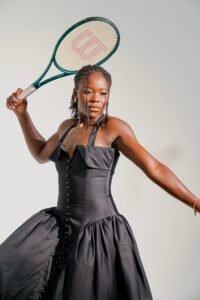
TEAM:
Editor in Chief : @gwenmadiba
Photographers: @Esther.Balik / @Chrissimba
Graphic Designer: @Freshh_Anderson
Designers: @ysl, @tmo_international, @dnaa_byiconicinvanity, @fatherslandthebrand
MUA: @Breanna.harmon
Creative Direction: @mazyonce, @maevachauvinn
Powered by @rollingstoneafrica @mwankomofficial
#RollingStoneAfrica #ICONIssue #VickyMboko #VictoriaMboko #LegacyInMotion #CoverStory #YoungIcon #Trailblazer

